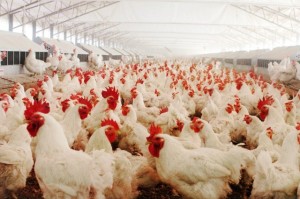Maryland Decides Chickens Shouldn’t Eat Poison Anymore

Maryland’s state motto is “Strong Deeds, Gentle Words.”
Last week, the state’s farms got a taste of what that means: On Tuesday, Maryland implemented a ban to end the use of an arsenic additive commonly included in chicken feed, making it the first state ever to do so.
The additive in question is Roxarsone, which is employeed for its ability to kill parasites and promote growth in chickens. In 2011, the Food and Drug Administration (FDA) determined that chickens that ate feed treated with Roxarsone had higher levels of inorganic arsenic—a known carcinogen—in their bodies than chickens who did not eat treated feed. When Roxarsone was approved by the FDA, officials had believed that the organic arsenic in Roxarsone remained as such (and therefore non-carcinogenic) after the birds digested it. When inorganic arsenic was found in the edible tissue of birds during the 2001 study, the FDA realized that assumption was wrong.
By 2012, despite the fact that Pfizer, Inc., Roxarsone’s producer, had voluntarily discontinued sales of the chemical, a debate heated up in Maryland over whether to ban the substance. On one side stood stakeholders in the poultry industry; on the other, health advocates and environmentalists. The FDA had publicly stated in 2011 that, despite its findings, consumers had no reason to fret about eating Roxarsone-fed chicken. But critics balked at the suggestion that adding more carcinogen into the food system was nothing to worry about.
Martha Noble, Senior Policy Associate at the National Sustainable Agriculture Coalition tells TakePart explains that in trying to understand how a carcinogen became such a common addative, it’s important to know how the poultry industry functions.
“What you’re looking at in a lot of these cases is that the poultry processor has contracts with growers where they [the processers] provide the chickens and they provide the feed. So it isn’t necessarily that individual poultry farmers have chosen to use this feed. A lot of them have no choice if they want to have a contract. They’re being provided with feed that’s already treated,” she explains. This issue, she adds, doesn’t come down to individuals; it’s about how the industrialized chicken industry produces its product and what it requires in its contracts.
“[Farmers] don’t have a choice about what feeds they use,” Noble says. “And even if they did have a choice, they don’t know what’s in it, because there are no labeling requirements in a lot of states. I don’t think a lot of these farmers would use the feed if they knew. But they don’t even know.”
In that sense, the chicken-and-egg debate about who is ultimately responsible for food safety—food regulators or food producers—swings back around to the FDA.
Though Roxarsone is no longer being sold, there are no guarantees that it won’t return to the market, and that’s why state bans could still play an important role in keeping arsenic out of chicken meat. The FDA isn’t exactly known for making quick progress on food safety issues, so state-by-state bans are one way to speed up the regulation of products like Roxasone.
But Nobel is doubtful that other states will follow Maryland’s lead. “A lot of the chicken production is in Southern tier states that have a long history of hostility toward regulation,” she says, citing opposition to the regulations of the federal Clean Water Act as an example. “They’re not known for regulating,” she says. “It took Maryland quite awhile to get to where they got.”
As for the FDA, she feels equally unconfident. “I think it would be great if we could get a uniform, federal, nation-wide ban on the use of these arsenicals. It’s now not only about food safety, but water quality, and we’ve had histories in the past of bad, toxic build-up from pesticides, and to me, the only difference here is that you’ve run the pesticide through a chicken first.”
That’s not to say all hope is lost, however: If the states or the FDA don’t make changes, companies still can. Perdue Farms, a major chicken producer in Maryland, elected to ban Roxarsone from its operations in 2007. With annual sales of more than $4 billion, cutting the additive has hardly caused the company to miss out on its piece of the pie. The decision “was part of our evolution, if you will,” Perdue representative Julie DeYoung tells TakePart. “We figured out that by paying close attention to methods and our environment, we could raise good, healthy birds without it.” Feedback from consumers, she says, played a role in the company’s decision to drop Roxarsone.
“That’s consumer perception coming into play.”
Source:
http://news.yahoo.com/maryland-becomes-first-state-ban-arsenic-chicken-feed-213316910.html